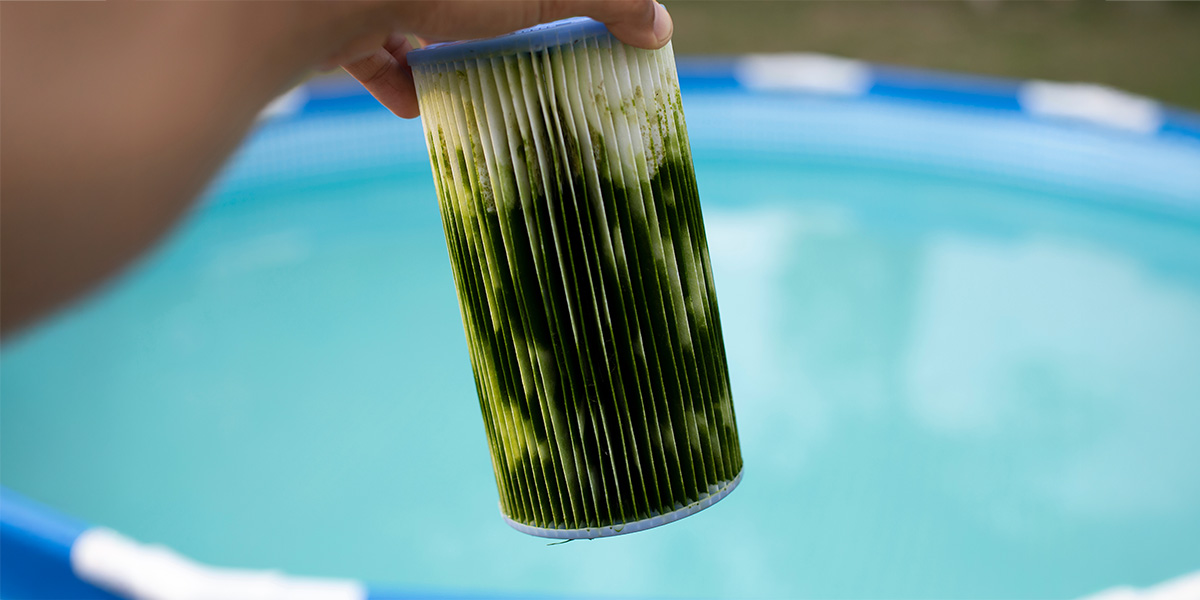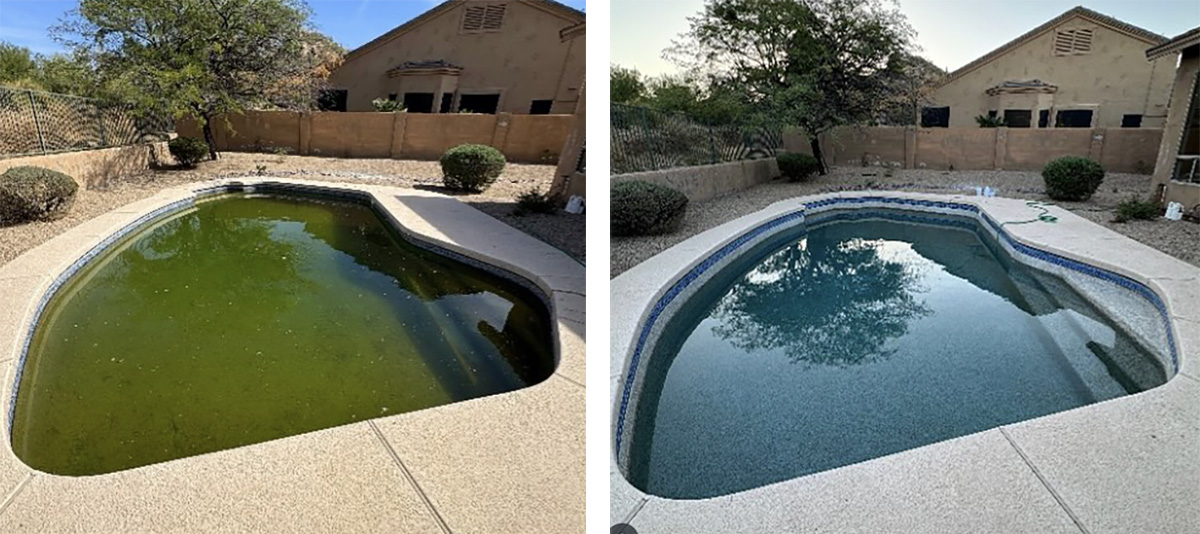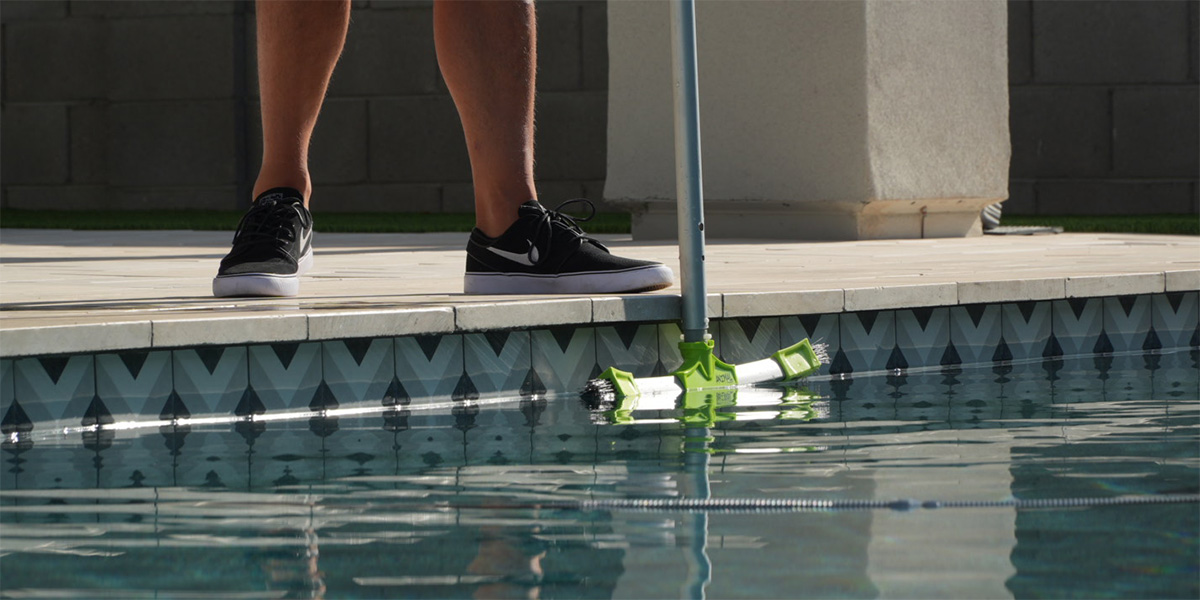What Causes Green Pool Water, and the Best Solutions to Consider
Quick Answer: Green pool water is caused by algae growth, usually triggered by low chlorine, warm temperatures, and poor water circulation. Mild cases can be treated with shock and brushing, but severe or recurring algae blooms often require draining and chlorine washing to kill the algae, followed by acid washing to remove the stains they leave behind.
What is Green Algae?
Green algae is the most common type of algae found in swimming pools. It’s a microscopic plant-like organism that multiplies rapidly in warm water when sanitizer levels drop.
- It starts as a light green haze or cloudiness.
- It can quickly turn the water bright green or swamp-like within days.
- It spreads across walls, steps, and floors, creating slimy surfaces.
Unlike black algae, which roots deep into plaster, green algae floats freely through the water and coats surfaces in a slick layer.
Why Green Algae is a Problem
Green algae may seem harmless, but it can:
- Cloud and discolor the water, hiding hazards beneath the surface.
- Make surfaces slippery, increasing the risk of slips and falls.
- Consume chlorine, forcing you to use more sanitizer.
- Clog filters and strain pumps, shortening equipment lifespan.
- Harbor harmful bacteria that compromises water safety.
Once a pool turns green, chlorine becomes less effective, which allows algae to spread faster — creating a cycle that’s hard to break.
*The Centers for Disease Control (CDC) notes that algae in water can harm the health of animals and people, and also poses risks to the environment (CDC: Harmful Algal Blooms).

How to Tell if you Have Green Algae
Green algae is fairly easy to spot once you know the signs.
1. Cloudy or Green-Tinted Water
Early green algae growth appears as slightly cloudy, greenish water, especially after hot days or heavy use.
2. Visible Slimy Coating on Surfaces
As it grows, green algae forms a slippery film on steps, walls, and ladders that brushes away but returns quickly.
3. Water Gets Greener After Brushing
If brushing the walls releases green clouds into the water, that’s a sure sign algae is present.
4. Chlorine Levels Drop Rapidly
Green algae consumes chlorine, so if your levels keep falling even after shocking, algae is likely multiplying faster than it can be killed.
Why Green Algae Keeps Coming Back
Many homeowners shock, brush, and vacuum their green pools only to see algae return within weeks. This happens because:
- Spores remain in pores and crevices of plaster and grout, surviving normal chlorination.
- Old water contains high levels of nutrients and dissolved solids that help algae thrive.
- Circulation dead spots (behind ladders, corners) provide algae safe places to regrow.
If algae keeps returning even after shock treatments, you’re likely dealing with embedded contamination that requires a deeper solution.
How Chlorine Washing and Acid Washing Work Together
When a green pool reaches the point of thick, swamp-like water or repeated blooms, chemical treatments alone usually aren’t enough.
Professional cleaners typically use two steps:
-
Chlorine washing is used to kill green, black, and mustard algae on contact, eliminating the living organisms on the pool’s surface.
-
Acid washing is used afterward to remove the stubborn stains and discoloration the algae leaves behind, including organic and mineral buildup.
This combination both kills the algae and restores the pool surface to a clean, bright condition.

When This Deep Cleaning is the Right Solution
Chlorine and acid washing aren’t needed for mild green algae blooms — those can often be treated with shock, brushing, and filter cleaning.
But this deep cleaning approach is best when:
- The pool water is completely green or swamp-like.
- Algae keeps coming back shortly after treatment.
- The pool has been stagnant for weeks or months.
- Surfaces are stained or discolored from repeated algae growth.
Why Arizona Pools are Especially Vulnerable
Green algae can bloom anywhere, but Arizona pools face unique conditions that make it more likely:
- High heat and intense sunlight create ideal growth conditions year-round.
- Warm water and minimal winter downtime mean algae can bloom even in cooler months.
- Dust and debris from the desert air introduce organic matter that feeds algae.
Because of these factors, green pool water can develop very quickly in Phoenix, sometimes in just a few days without proper sanitation — which is why so many homeowners need urgent “green pool” cleanups.
Preventing Green Algae from Coming Back
Once your pool has been restored (especially after an acid wash), you can prevent future green algae blooms with a few simple habits:
- Maintain chlorine at 2–4 ppm and shock after heavy use or storms.
- Brush and vacuum weekly to remove spores and organic matter.
- Maintain pH (7.4–7.6) and alkalinity (80–120 ppm) to keep sanitizer effective
- Run the pump daily to ensure proper circulation and filtration.
- Clean filters regularly to remove debris and trapped algae spores.
Consistent care and balanced water chemistry make it much harder for algae to return.

Common Questions About Green Pool Water
Q: What causes green pool water?
A: Green pool water is caused by algae blooms, usually from low chlorine, warm water, and poor circulation.
Q: Can I fix a green pool with just shock and brushing?
A: Mild blooms can be treated this way, but severe or recurring cases often require draining and acid washing.
Q: How long does it take for a pool to turn green?
A: In hot weather, a neglected pool can turn green in just 2–3 days.
Q: How often should I acid wash my pool?
A: Acid washing is safe every 2–3 years, which also aligns with the standard draining schedule for most Arizona pools.
Final Thoughts
Green algae is one of the most common — and most frustrating — pool problems. It multiplies quickly in warm water, consumes chlorine, and can take over a pool in days.
While light blooms can be shocked and brushed away, severe or recurring green algae typically requires chlorine washing to kill the algae itself, followed by acid washing to remove the stains and restore your pool’s clean surface.
For homeowners in Arizona and the Phoenix metro area, Bullfrog Pool Tile Cleaning’s Pool Acid Washing service provides professional, eco-friendly acid washing to fully remedy your green pool and restore your water to a safe, crystal-clear condition.













